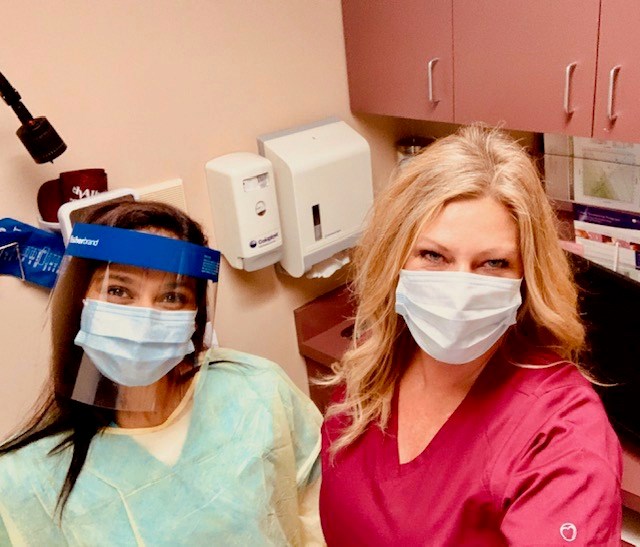After 40 years as a doctor in the Richmond medical community, Dr. Zahir Vellani retired in early April.
But because of physical distancing orders in place, he left his practice without being able to shake hands with his patients or hug his colleagues good-bye.
Vellani was part of a medical practise located in the Health Sciences Building across from Richmond Hospital – the practise has three doctors now, Dr. Cheryl Hau, Dr. Basil Segal and Dr. Amrita Govindraju.
Vellani’s muted departure is just one of the radical changes the medical office has undergone because of the COVID-19 pandemic, from telemedicine to cancelled procedures to getting injections and swabs in patients’ cars.
The front doors of the office are locked, but medical staff is triaging phone calls, explained Kirstene Dickson who has worked at the front end of the office for more than two decades.
Medical Services Plan (MSP) now allows doctors to bill for phone appointments, and this is an option for some patients – but not all.
Not everything can be done over the phone. The lack of face-to-face meetings means doctors are unable to read body language and can’t do hands-on exams, an important part of medicine, Dickson said.
They also can’t assess rashes, injuries or painful body parts over video or phone, she added.
However, when dealing with possible COVID-19 patients, the clinic follows the guidelines of the provincial health officer, and they will triage over the phone, telling patients whether they should stay home, get tested or go to emergency.
“The doctor will make the decision after discussing with the patient and guide them appropriately,” Dickson said.
Dickson pointed out there is always a doctor physically present at the clinic, and if needed, the doctor can come to the patient’s car in the parking lot to do injections or testing.
At the office, however, there is personal protective equipment used, chairs are spaced out, the magazines are gone and there is plenty of hand sanitizer available.
“With so few patients coming in, we are now able to put them in the exam rooms immediately,” Dickson explained.
Despite missing seeing their patients, Dickson said they want them to stay safe, following the advice of the provincial health officer.
But, she added, patients shouldn’t hesitate to contact the office for any medical concern.
“We worry about patients who may be holding off calling for an appointment with worrisome symptoms because they do not want to ‘overwhelm the system,’” she said.
This message was reiterated by Vancouver Coastal Health (VCH) as they urge the public to seek urgent or emergency care if needed, saying emergency departments are prepared to safely receive patients.
In a press release, VCH said the public is advised to seek urgent and emergent care without delay, to prevent the exacerbation of medical conditions.
Some health conditions that may require emergency care include trouble breathing or catching your breath, several abdominal or chest pain or pressure, weakness or tingling on one side of your body, loss of consciousness or heavy bleeding.
For non-life-threatening urgent care such as sprains, strains, fevers, minor burns and infections or when you are unable to see your family doctor or care provider, urgent primary care centre have extended hours.
The 24-hour non-emergency 811 line is also available with nurses, pharmacists and dieticians available to answer questions.
Furthermore, patients needing a refill of regular medications don’t need to visit a doctor or nurse-practitioner – pharmacists are refilling these or giving an emergency supply to avoid non-essential visits to medical offices.



